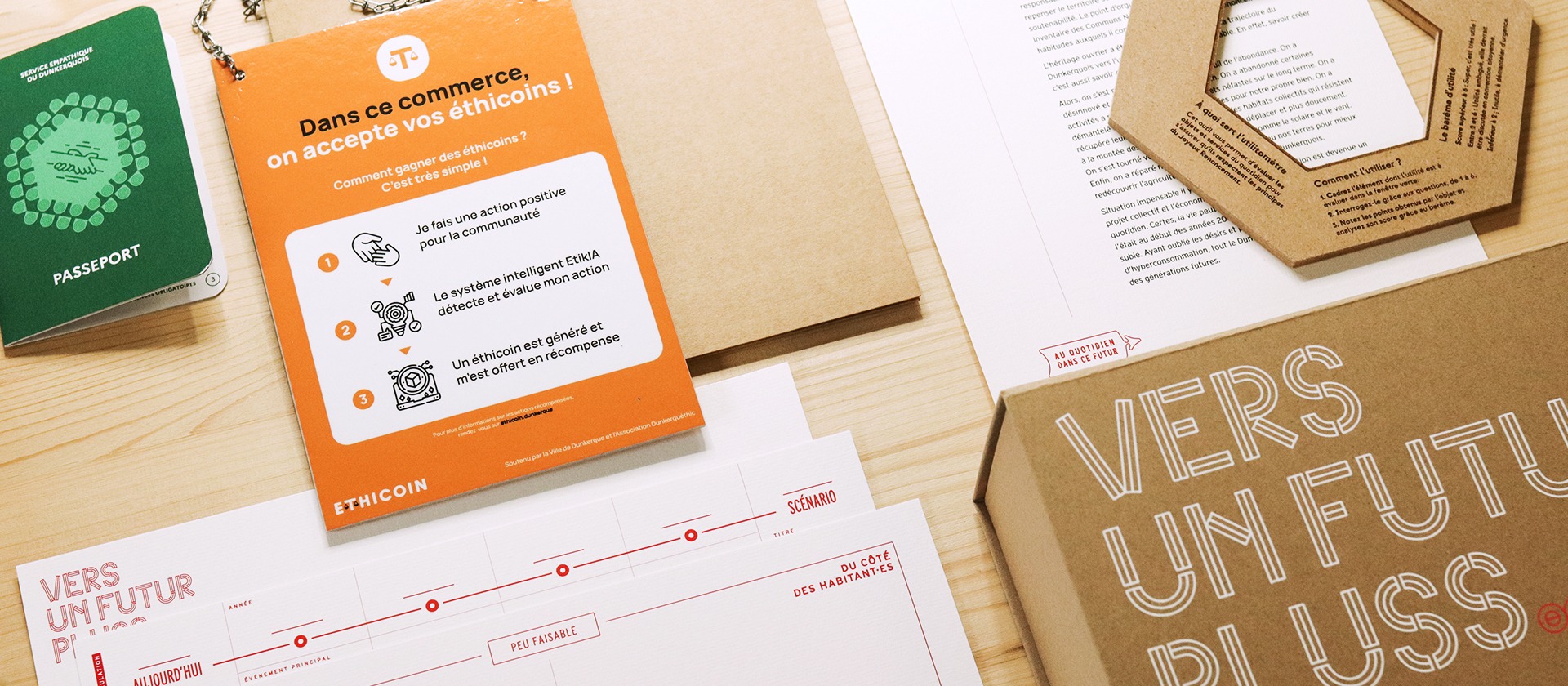
A bright future for local industries
In the face of crises, imagine and discuss the impacts of a local, useful, solidary, and sustainable production in the Dunkirk area and the Hauts-de-France region (North of France)
As the aftershocks of the COVID-19 crisis continue to affect society and the economy, the Actors for a Solidarity Economy in Hauts-de-France (APES, in northern France) launched a manifesto in 2021 for Local, Useful, Solidarity-driven and Sustainable Production, known as PLUSS.
The timing seems right: calls for reindustrialisation and energy transition are increasing, some industries are beginning to decarbonise, and the search for meaning in work is resonating anew. However, APES observes that current representations and imaginations often indulge in misconceptions about what local production is or should be, and how it should be encouraged.
In response, APES sought to bring to life its 10 principles for PLUSS – such as empowering territories, preserving the commons, or mastering production tools – through a forward-looking, unifying experience. The aim: to overcome a certain imaginative stagnation to demonstrate how, tomorrow, PLUSS could develop the local economy and the resilience of territories.
We co-constructed the “Futures Box” Vers un Futur PLUSS (Towards a Future with PLUSS), an all-in-one kit designed to allow APES to facilitate meetings with both public and private stakeholders, as well as residents. Each session was intended to offer a participatory projection experience, encouraging participants to:
- Navigate the interconnected perspectives of local production,
- Position themselves on the multiple issues of an economy that is above all solidary and sustainable,
- Form an opinion on this foundational topic, and to express their ideas for a system that strengthens territorial resilience.
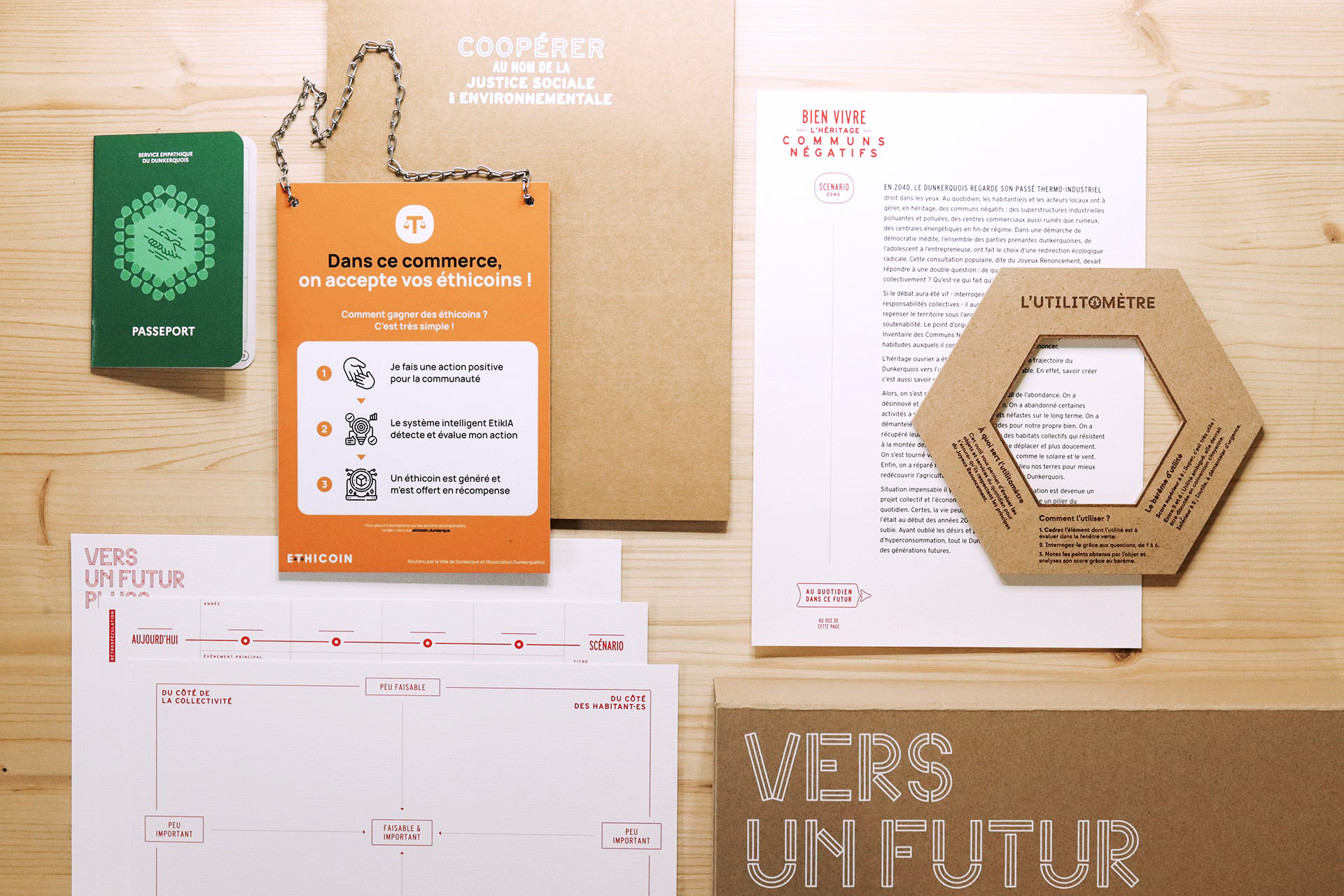
Building the design fiction scenarios from Vers un Futur PLUSS was also a participatory initiative, through a series of co-writing workshops that brought together actors from the social and solidarity economy (SSE), the associative world, and major industries based in the Dunkirk area. While the angle of desirable futures served as a common thread for speculation, this collaborative approach paved the way for nuanced narratives that blend myths and realities of industrial sovereignty, socio-environmental justice, post-growth, and ecological redirection.
The exploration programme included three possible futures:
- Our sovereign territory
What if, by 2030, the territory emancipated itself from distant decision-makers to regain autonomy and solidarity? - Cooperating for socio-environmental justice
What if, by 2035, the territory pursued a transition that was fair to all living entities? - Living well with the legacy of negative commons
What if, by 2040, the territory learned to renounce infrastructure, activities, and behaviours that endanger future generations?
Each scenario has been adapted in two versions, one rooted in the Dunkirk area and another adjusted for the wider Hauts-de-France region.

Inspired by the famous bitcoin, the Ethicoin of Hauts-de-France is a complementary, local cryptocurrency. Each Ethicoin is “minted” digitally by the community, according to a unique principle. A virtual coin is generated and awarded for every ethical action taken by a local resident that contributes to a fair social and ecological transition.
Technology is employed to identify “good actions” deserving of an Ethicoin. The territory is dotted with sensors that help artificial intelligence monitor real-time cooperation between residents, animals, and plants. This network automatically detects and rewards those who act in solidarity while preserving the environment.
In a virtuous cycle, the Ethicoin can be used to make purchases at local shops and other services that embrace a local, useful, solidary, and sustainable production model. However, this system does raise questions: doesn’t this perpetual benevolent surveillance, which rewards ethical consumption, risk reinforcing privilege among those who already have the means to “do good”?
Excerpt from the scenario
Cooperating for socio-environmental justice

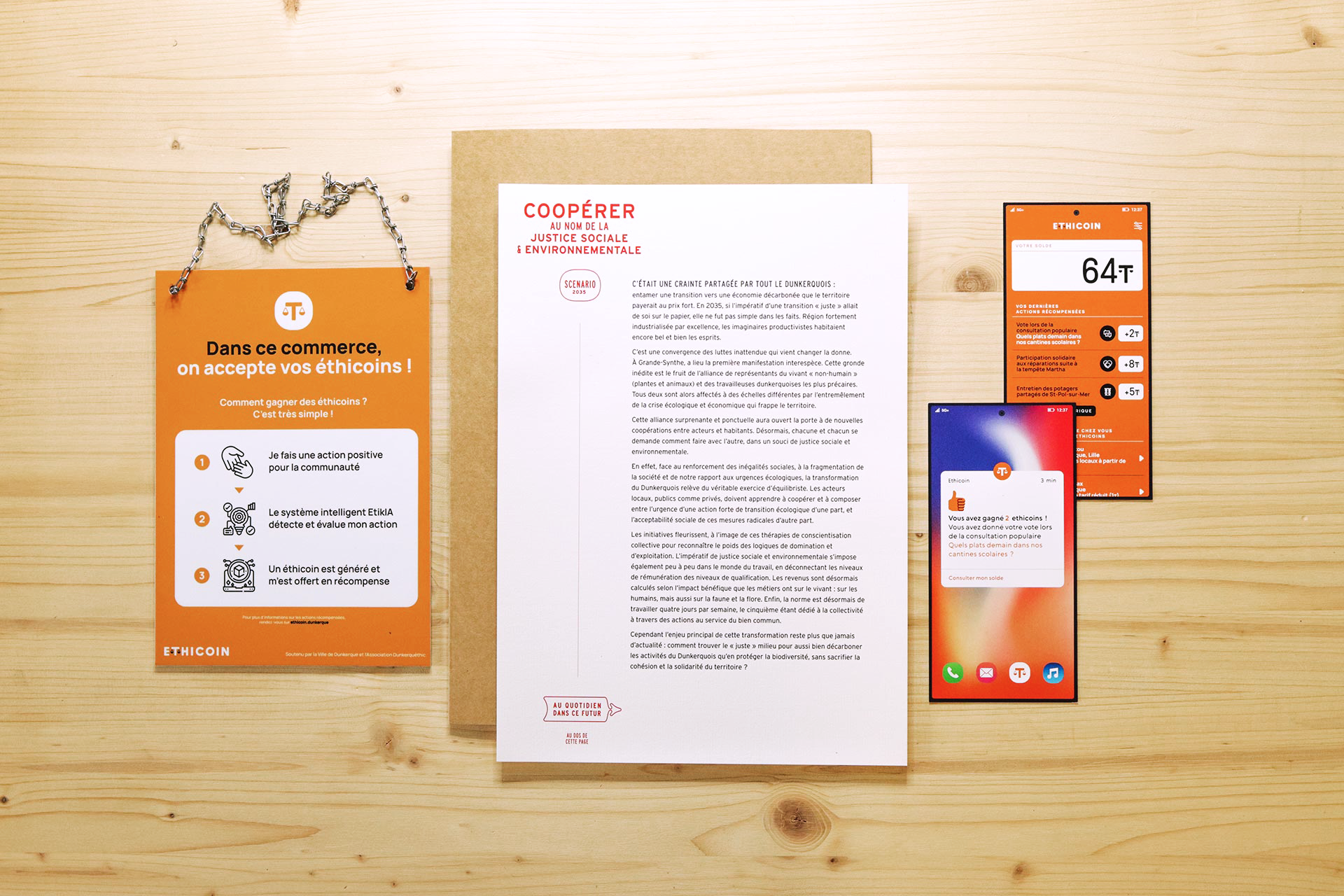
↑ The artefacts from the Cooperating for Socio-Environmental Justice scenario highlight the Ethicoin, a local cryptocurrency generated for each action that contributes to an inclusive ecological transition.

“We pulled a Jean Bart on them!”
This is how the residents of Dunkirk describe their historic act of piracy in the year 2030. In the spirit of the corsairs, the entire Dunkirk area united to dispossess distant decision-makers of their prized assets (infrastructure, production facilities, capital) and thus (re)gained its autonomy. Leaders of multinationals and central administrations saw their grip eroded!
The territory re-centred itself as a riposte to failing globalisation. This drive for sovereignty was supported by a population willing to endure the strains of autonomy, regional public authorities keen on relocalising the economy, and the complicity of legal experts “hacking” contract loopholes.
[…]
With this renewed sovereignty, a new practice emerged in Dunkirk: the decisive immersion. Anyone from outside the Dunkirk region whose decisions impact the territory, in both the public and private sectors, must participate in a unique exercise: immersion to lead. In other words, decision-makers must spend at least three months living with locals to be recognised as legitimate authorities.
Excerpts from the scenario
The Sovereign Dunkirk

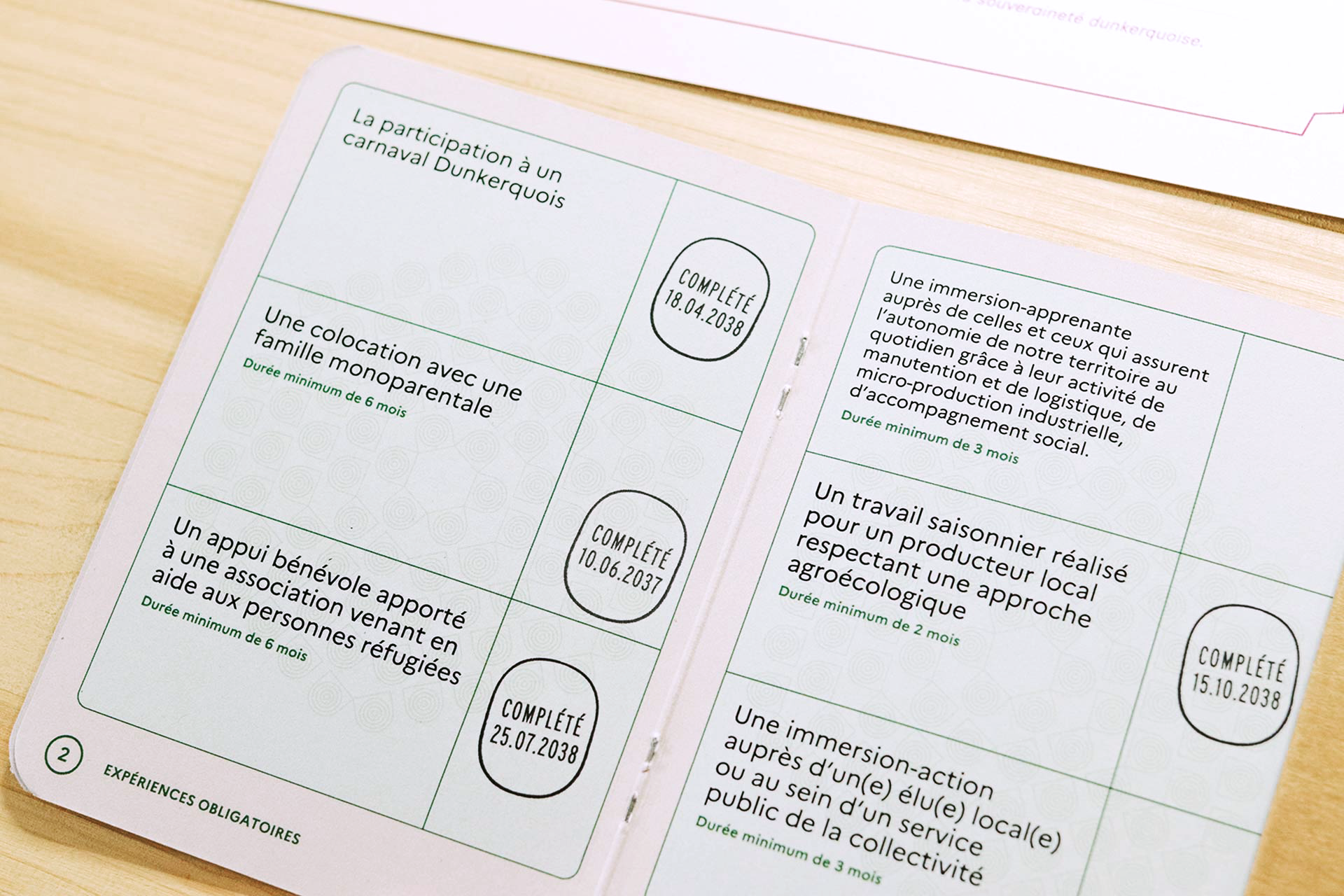
↑ The passport of a Dunkirk resident completing her empathic service, an initiative designed for immersion into communities beyond her own.

Saying “no” is an art!
How can we say “no” to certain activities that may be comfortable for us but are detrimental to our ecosystems? How can we bid “farewell” to aspirations that we can no longer afford?
The Essentials Kit offers an answer. Comprising a set of practical tools, this all-in-one helps individuals question daily necessities and luxuries. It supports gentle renunciation to ensure that we keep what’s truly essential.
A true key to a “just enough” life, the kit is given to every resident in a ceremonial initiation at age 16. It is also presented to new arrivals in the Dunkirk area.
Excerpt from the scenario
Living well with the legacy of negative commons

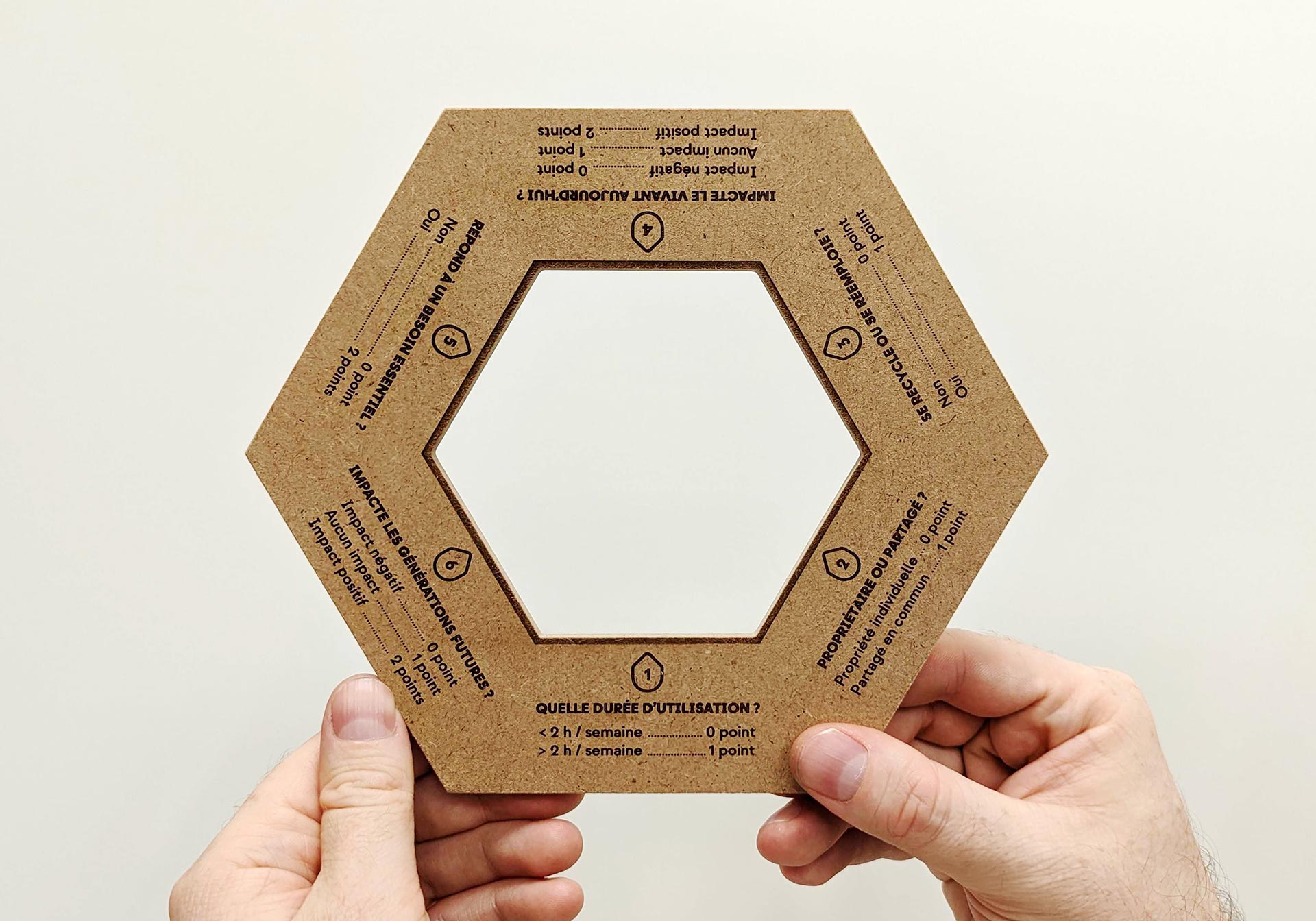
↑ The Use-o-meter, an indispensable tool from the Essentials Kit, helps evaluate whether everyday objects and services are truly useful, solidary, and sustainable.
To complete the futures box, we adapted several of our in-house tools to facilitate the mobilisation of design fictions and train Apes members in their facilitation. With this futures box in hand, the network of actors was able to bring Vers un Futur PLUSS to the land of belfries, inspiring reflection and engagement among the public, as well as political and economic stakeholders, around this “new local deal” that is solidary and sustainable.
Bringing this future vision closer to the ground realities helped to identify and anticipate the barriers and enablers to generalising PLUSS in the Hauts-de-France region. In tandem, Vers un Futur PLUSS also nurtured vocations and initiatives aligned with this vision of the social and solidarity economy.
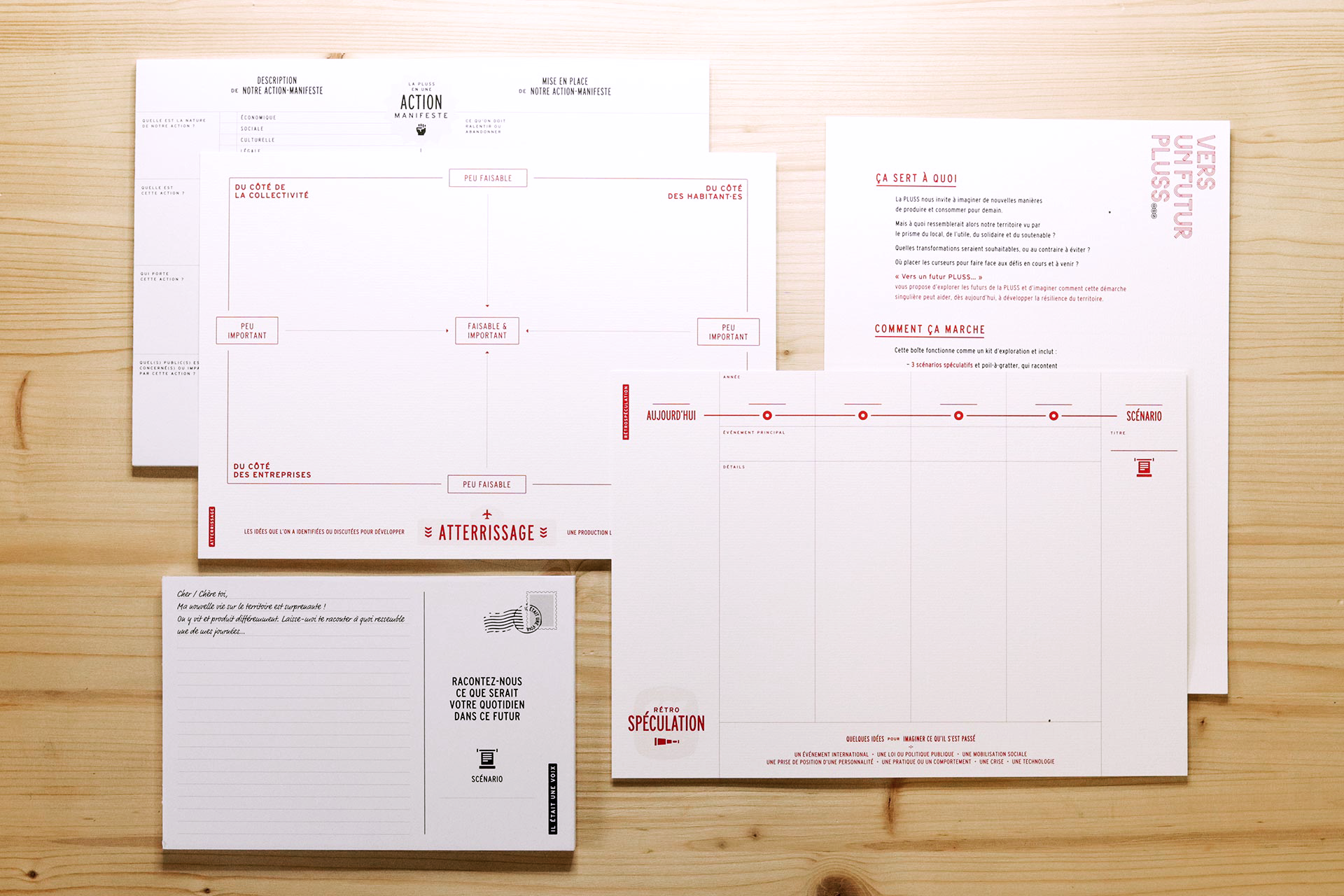
↑ Several tools from Vers un Futur PLUSS futures box enable discussions, analyses, and new developments of these fictions.
